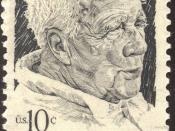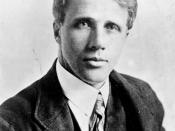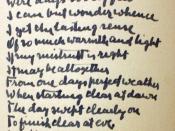What is the goal in a poem? Why do writers write? Most poems are an attempt to pass on a message, to give a moral, or in any case, to communicate in one way or another. An example of a writer doing this in a poem may be seen in An Old Man's Winter Night, by Robert Frost. Robert Frost (1874-1963) wrote An Old Man's Winter Night, perhaps his most well conceived work and published it in the book 'Mountain Interval', released in 1920 as a fine peak to his career. The poem tells the story of the last night before an old man's death. This man is portrayed as being lonely, and without meaning to anyone except for himself. The old man seems to realize this in a certain point in the poem, and decides that he no longer wants to live. He then goes to sleep, however soon after he is disturbed by the shifting of a log.
He then shifts, as the log did, and dies seemingly without pain, "still sleeping" as Frost says. The poem appears to have a message to transmit, which can be unveiled through some close reading. There are several reasons which convince the reader that An Old Man's Winter Night is memorable, impressive, and effectively passes on a moral.
Firstly, the reader is engaged into the scene with no information about the old man, which parallels the old man's situation, as neither does he know how he has become what he is: "What kept him from remembering what it was / That brought him to that creaking room was age." Perhaps this was done to make the reader just as lost as the old man and able to enter more deeply into the old man's character, thus being able...


